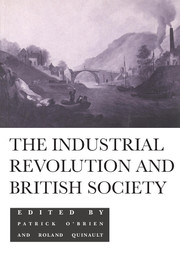Book contents
- Frontmatter
- Contents
- List of contributors
- Preface
- 1 Introduction: Modern conceptions of the Industrial Revolution
- 2 Women in the workforce
- 3 Reinterpretations of the Industrial Revolution
- 4 Religion and political stability in early industrial England
- 5 Sex and desire in the Industrial Revolution
- 6 Political preconditions for the Industrial Revolution
- 7 Crime, law and punishment in the Industrial Revolution
- 8 The Industrial Revolution and parliamentary reform
- 9 Margins of the Industrial Revolution
- 10 Social aspects of the Industrial Revolution
- 11 Technological and organizational change in industry during the Industrial Revolution
- Postscript: An Appreciation of Max Hartwell
- Index
10 - Social aspects of the Industrial Revolution
Published online by Cambridge University Press: 05 June 2012
- Frontmatter
- Contents
- List of contributors
- Preface
- 1 Introduction: Modern conceptions of the Industrial Revolution
- 2 Women in the workforce
- 3 Reinterpretations of the Industrial Revolution
- 4 Religion and political stability in early industrial England
- 5 Sex and desire in the Industrial Revolution
- 6 Political preconditions for the Industrial Revolution
- 7 Crime, law and punishment in the Industrial Revolution
- 8 The Industrial Revolution and parliamentary reform
- 9 Margins of the Industrial Revolution
- 10 Social aspects of the Industrial Revolution
- 11 Technological and organizational change in industry during the Industrial Revolution
- Postscript: An Appreciation of Max Hartwell
- Index
Summary
Few paragraphs have done more than Dickens's famous depiction of ‘Coketown’ in Hard Times to envision the social repercussions of industrialization: the creation of a mass urban society, governed by the regime of the factory and the pace of the machine, an environment polluted and despoiled, and its inhabitants rendered anonymous and dehumanized. Indeed, as we know, the changes which are subsumed under the umbrella title of the Industrial Revolution were soon overlain by a complex process of comment, criticism and assessment. Dickens was only one of a number of figures in the early Victorian period whose views have often been summoned to give evidence about the social dimension of economic change (Tillotson 1954; Perkin 1969; Wiener 1981). Other writers cited in this context usually include Carlyle, Disraeli, Kingsley, Mrs Gaskell, Engels and Tocqueville. All writing in the period from the 1830s to the 1850s when the effects of industrial change figured largely in the national debate known as the ‘Condition of England’ question, they reflected the first public recognition that Britain was to some significant degree a different society to what it had been in the past. They also serve to remind us that discussion of the social repercussions of industrialization did not occur until well into the ‘classic’ first Industrial Revolution. Consider the social criticism of the period prior to the 1830s.
- Type
- Chapter
- Information
- The Industrial Revolution and British Society , pp. 229 - 253Publisher: Cambridge University PressPrint publication year: 1993
- 10
- Cited by



